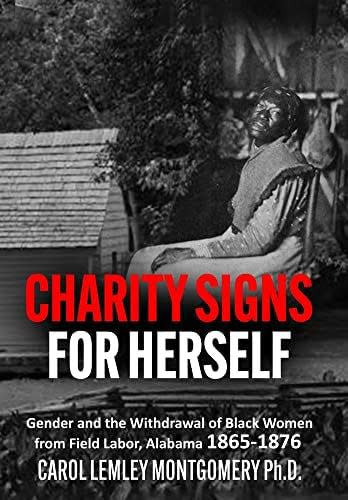Former Kure Beach mayor publishes late wife's dissertation on the end of slavery

Carol Montgomery, who died Sept. 15 at the age of 79, lived a fascinating life.
An Army wife, she traveled the globe, learned to fly, watched sea turtle nests at Fort Fisher and served as a volunteer and docent at national parks and wildlife refuges around the United States.
She also earned a Ph.D. in history at the University of California Irvine.

Now her husband, former Kure Beach Mayor Mac Montgomery, has published her 1991 doctoral dissertation, "Charity Signs for Herself." The volume is available from Amazon.com, BarnesAndNoble.com and at local libraries.
Montgomery's academic subtitle, "Gender and Withdrawal of Black Women from Field Labor, Alabama, 1865-1876," might be intimidating to some readers. Still, she discusses issues that prove surprisingly timely.
And the story is not just limited to Alabama. It is rooted at Somerset Place Plantation, near Edenton, N.C. Celebrated in Dorothy Spruill Redford's "Somerset Homecoming," the plantation is now a state historic site, which pioneered interpreting history from the slaves' point of view.
More: Wilmington booksNew book investigates 'More Curious Tales from Old Wilmington and the Lower Cape Fear'
Montgomery doesn't tell her story chronologically, but in runs like this: In 1842, Thomas C. Harrison, a poor doctor, married Louisa Collins, from the wealthy family that owned Somerset. (Her father and brothers regarded him as a parvenu and male gold-digger, so Harrison had to work hard to prove himself.)
Louisa's dowry brought 50 slaves. Under Victorian law, Harrison now had control of them, so he marched them to Alabama to start a new plantation of his own, Faunsdale, near Selma.
In 1858, Harrison died, and Louisa remarried her Episcopal priest, the Rev. William Stickney. Under law at the time, the husband was the boss, so Stickney became master of Faunsdale. He was in charge when Union troops arrived in 1865 and (technically) freed the slaves. Stickney responded by signing the freedmen up for work contracts, which were little better than slavery.
Montgomery, who was born in Birmingham, Ala., uses the records of Faunsdale and Somerset as virtual core samples into the history of plantation life before and after slavery.
And she notices a paradox: Before the Civil War slave men and women worked side by side in the cotton fields, the women producing as much as the men did (and sometimes more).
Between 1865 and 1876, however, the number of women who signed labor contracts steadily declined. Traditional accounts of the period claimed that Black women withdrew into domestic life and occupations because they wanted to.
Montgomery, however, suggests the story is more complicated. For one thing, black husbands now "signed for" their wives' work. (Remember, under law of the period, the man is the boss.)
Only single women, like the slave Charity Paine in the title, "signed for themselves." And their numbers became fewer, possibly because Stickney found them too contentious and argumentative and not submissive enough.
One or two plantations alone are not enough to prove Montgomery's thesis. Yet she offers a detailed picture of plantation life before and after the Civil War.
Book review
'CHARITY SIGNS FOR HERSELF: Gender and the Withdrawal of Black Women from Field Labor, Alabama 1865-1876'
By Carol Lemley Montgomery
This article originally appeared on Wilmington StarNews: Review of Charity Signs for Herself by Carol Lemley Montgomery

